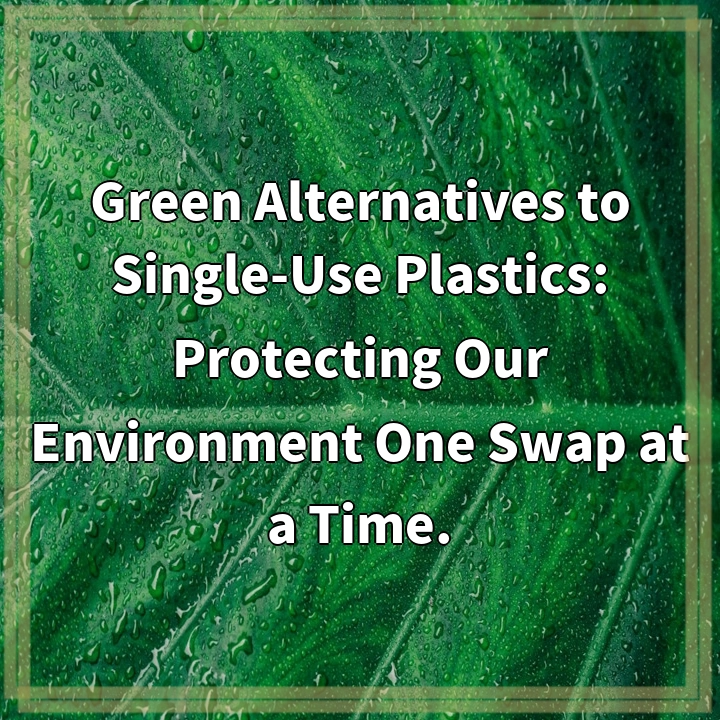
What it is:
Single-use plastics are items that are designed to be used once and then discarded. This includes products such as plastic bags, straws, coffee stirrers, and food packaging. These plastics have become a major concern for our environment due to their long-lasting nature and detrimental effects on ecosystems and wildlife.
Green alternatives to single-use plastics refer to environmentally friendly options that can be used as substitutes. These alternatives are typically made from biodegradable materials or are designed to be reusable, reducing the need for single-use plastic items.
As awareness about the negative impacts of plastic pollution grows, individuals and businesses are increasingly seeking out green alternatives to single-use plastics. This shift towards more sustainable options aims to reduce waste, conserve resources, and protect our environment for future generations.
Real-world problems:
The widespread use of single-use plastics has led to several significant environmental problems. Here are some of the key issues associated with these materials:
1. Plastic Pollution:
Single-use plastics are a major contributor to plastic pollution, both on land and in our oceans. These items are often not properly disposed of or recycled, leading to them ending up in natural environments. Plastic pollution has adverse effects on marine life, such as entanglement and ingestion, and poses a threat to entire ecosystems.
2. Resource Depletion:
The production of single-use plastics requires large amounts of fossil fuels and natural resources, contributing to resource depletion and greenhouse gas emissions. Extracting and processing these raw materials leads to habitat destruction, air and water pollution, and further exacerbates climate change.
3. Waste Management Challenges:
The disposal of single-use plastics presents significant challenges for waste management systems. These materials often end up in landfills, where they can take hundreds of years to degrade, or they may be incinerated, releasing harmful pollutants into the atmosphere. In many cases, plastic waste is not properly managed, leading to littered landscapes and overwhelmed waste infrastructure.
4. Health Impacts:
Single-use plastics can have adverse health effects, both for humans and wildlife. Certain chemicals used in the production of plastics, such as bisphenol-A (BPA) and phthalates, have been linked to various health issues, including hormone disruption, reproductive problems, and developmental abnormalities.

Solutions to Green Alternatives to Single-Use Plastics
Addressing the problems associated with single-use plastics requires a concerted effort from individuals, businesses, and governments. By adopting green alternatives, we can reduce plastic waste, conserve resources, and protect our environment. Here are some solutions to consider:
1. Reusable Options:
Encouraging the use of reusable alternatives is a key solution to reducing single-use plastics. This includes items like reusable grocery bags, water bottles, coffee cups, and utensils. By opting for reusable options, we can significantly cut down on the need for disposable plastics.
2. Biodegradable and Compostable Materials:
Using biodegradable and compostable materials can help mitigate the negative environmental impacts of single-use plastics. These materials, such as plant-based plastics or bioplastics, are designed to break down naturally over time, reducing their long-term presence in the environment.
3. Government Policies and Regulations:
Governments play a crucial role in implementing policies and regulations that promote the use of green alternatives and discourage the use of single-use plastics. This can include levying taxes on plastic products, implementing bans on certain items, and incentivizing sustainable practices.
4. Increased Recycling and Waste Management:
Improving recycling and waste management systems is essential for reducing the impact of single-use plastics. Implementing effective recycling programs, raising awareness about proper disposal methods, and supporting initiatives that promote plastic recycling and upcycling can all contribute to a more sustainable waste management approach.
5. Consumer Education and Awareness:
Educating and raising awareness among consumers about the problems associated with single-use plastics and the availability of green alternatives is crucial. Providing information on the environmental impacts of plastic pollution and the benefits of adopting sustainable alternatives can empower individuals to make more eco-friendly choices in their daily lives.















